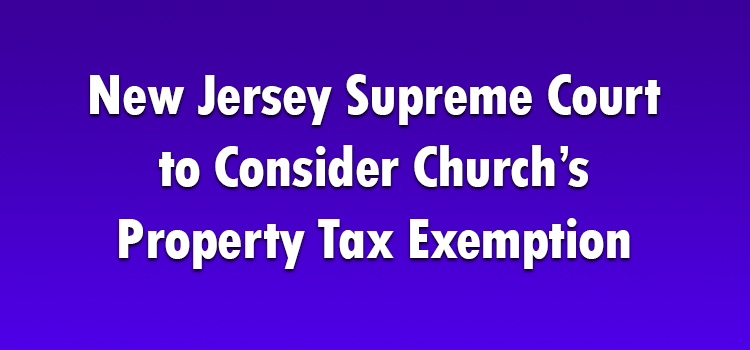The Supreme Court of New Jersey has agreed to consider Christian Mission John 316 v. Passaic City. The case involves when a property being converted to tax-exempt purposes will qualify for a tax exemption.

Facts of Christian Mission John 316 v. Passaic City
In 2009, Christian Mission, a church in the City of Passaic (City), purchased a lot (lot eleven) in the same block as its existing church and parking lot. That lot contained a warehouse that previously was used by a commercial business. Between 2009 and 2011, Christian Mission used the warehouse “as an extension of its regular religious activities,” although these “primarily” were conducted at the existing church. Christian Mission applied for an exemption for lot eleven; however, the exemption application was denied and then not appealed.
In late 2011, Christian Mission wanted to renovate the warehouse on lot eleven to transition it “to a formal church.” A tax assessor for defendant certified that as part of the reconstruction, “[t]he walls and interior [of the building were] stripped down to the frame, the windows [were] covered with plastic,” and by July 2012, the “building was essentially a shell or frame . . . .”
The reverend certified that “significant renovations” were made to the warehouse beginning in January 2012, and “conclude[ed] around September 2012.” He also certified that “[c]ommunity religious services began sometime around September [2012] with formal services commenc[ing] around the time of Thanksgiving 2012 . . . .” The reverend noted the warehouse was used between January and September 2012 for religious services at the construction site, which lasted approximately 20 minutes and were largely limited to church members working on the construction project and their spouses.
City inspections of the property were conducted on several dates both before and after Thanksgiving 2012, and continued through July 2013. Christian Mission was issued a temporary certificate of occupancy on April 15, 2013. The final certificate of occupancy was issued on July 23, 2013.
Christian Mission’s application for a 2013 tax year exemption for the warehouse lot was denied by the City on July 31, 2013. Shortly after, it filed a complaint in the Tax Court in which it contested both the denial of the 2013 tax year exemption and the amount of taxes assessed. In February 2018, the Tax Court denied Christian Mission’s motion for summary judgment and granted defendant’s, the effect of which was to deny plaintiff’s request in 2013 for a tax exemption for the warehouse lot. Citing N.J.S.A. 52:27D-133, the Tax Court concluded the State Uniform Construction Code Act “prohibit[ed] the use or occupancy of a structure until a certificate of occupancy has issued.” For properties not previously afforded a tax exemption, the court concluded that N.J.S.A. 54:4-3.6 implied “that the use cannot be achieved at the expense of the safety, welfare and well-being of the public.”
Appellate Division’s Decision in Christian Mission John 316 v. Passaic City
The Appellate Division affirmed, agreeing with the Tax Court that Christian Mission did not meet its burden of proving actual use based on the uncontested facts. “[T]here was no evidence the warehouse was available for public use or was being used for the public benefit as of October 1, 2012,” the court wrote. “This is particularly the case because there was no certificate of occupancy, which implied that the building was not actually in use for religious activities at the relevant time.”
The Appellate Division also held that the case was distinguishable from the Appellate Division’s decision in Society of the Holy Child Jesus v. City of Summit, 418 N.J. Super. 365 (App. Div. 2011), which holds that tax assessment statutes and construction and zoning laws are not to be read in pari materia. “It is not a case involving the revocation of a long-standing exemption based on a change in use. Christian Mission’s warehouse had no tax exemption because the prior owner previously used it for commercial purposes,” the court explained. “More importantly, this case does not involve any evaluation of the nature of a zoning violation because there simply was no certificate of occupancy, temporary or permanent. The Tax Court was not called upon to interpret the zoning laws, as it was acknowledged that there simply was no certificate.”
Issues Before the New Jersey Supreme Court
The New Jersey Supreme Court granted certification on December 10, 2019. The justices have agreed to answer the following question: “Was plaintiff’s property actually used for religious purposes prior to the tax assessment date and therefore exempt from local property taxes for the 2013 tax year under N.J.S.A. 54:4-3.6?”
Oral arguments have not yet been scheduled.
